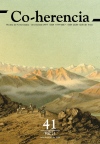Foucault After Foucault. Genealogies of Medical Biopower in the 21st Century Intellectual American Scene
Main Article Content
Keywords
Biopolitics, biopower, genomic medicine, history of the present, medicalization, welfare, multitude
Abstract
This paper’s focused on Michel Foucault’s reception and legacy among his followers in the American intellectual scene, especially in the University of California, Berkeley (1980-1981 and 1983). During the latter year, Foucault founded a researching seminar that embraced the first lines of a “genealogy of bio-power”. The works at Berkeley dealt with several topics. However, none of them were tightl related to what, I argue, best describes the contemporary functioning of biopower; that is, the medical-health device, or “medicalization”. I raise up here two main points: (1) inside the frame of a discussion about the concept of this notion I seek to highlight the exceptional critical force that this notion has in accordance to Foucault’s work in order to understand what it is going on in this very moment as in the same way as he himself sought to do an “ontology of the present”. (2) I seek also to put into notice that the biopower function, Today, is almost impossible to grasp without the intervention of the medical apparatus insofar its level of influence in current societies, something that could be shown in the birth and evolution of welfare, the eugenics experiments, the assisted reproduction, the public policies against the spread of viruses and its consequent fear of contagion, the exploitation of the use of genetically modified organisms, moreover, which one is the role of the preventive genomic medicine and so on.
Downloads
References
Arendt, H. (2009 [1957]). La condición humana (R. Gil Novales, Trad.). Paidós.
Canguilhem, G. (2009 [1966]). Lo normal y lo patológico (8.a ed., R. Potschart, Trad.). Siglo XXI.
Castel, F., Castel, R., & Lovell, A. (1982). The Psychiatric Society (A. Goldhammer, Trad.). Columbia University Press.
Castel, R. (1984). La gestión de los riesgos. De la anti-psiquiatría al post-psicoanálisis (N. Pérez, Trad.). Anagrama.
Deleuze, G. (1987). Foucault (J. Vázquez Pérez, Trad.). Paidós.
Donzelot, J. (1981). La policía de las familias. Familia, sociedad y poder. (Epílogo de G. Deleuze) (A. Falcón, Trad.). Nueva Visión.
Dreyfus, H. L. y Rabinow, P. (1988). Michel Foucault: más allá del estructuralismo y la hermenéutica (Posfacio de Michel Foucault, “El sujeto y el poder”; C. de Iturbe, Trad.). UNAM.
Eribon, D. (2004). Michel Foucault (T. Kauf, Trad.). Anagrama.
Ewald, F. (1986). Bio-Power. History of the Present, (2), 8-10. https://n9.cl/w0tw0.
Ewald, F. (1987). Risk, Insurance, Society. (An Interview with F. Ewald. Conduced by P. Rabinow with K. Gandal). History of the Present, (3), 1-2; 6-12. https://n9.cl/muz0r.
Foucault, M. (1992a). Nietzsche, la genealogía, la historia. En Microfísica del poder (pp. 7-31; J. Varela y F. Álvarez Uría, Trads.). La Piqueta.
Foucault, M. (1992b). Poder-cuerpo. En Microfísica del poder (pp. 111-118; J. Varela y F. Álvarez Uría, Trads.) [Entrevista en Quel Corps, 1975, sept. 2]. La Piqueta.
Foucault, M. (1998 [1976]). Historia de la sexualidad I. La voluntad de saber (U. Guiñazú, Trad.). Siglo XXI.
Foucault, M. (1999). Nacimiento de la medicina social. En Obras esenciales II. Estrategias de poder (pp. 363-384; J. Varela y F. Álvarez-Uría, Trads.). Paidós.
Foucault, M. (2001). Des suplices aux cellules. [Entrevista con R. P-Droit, 1975]. En Dits et écrits, I, 1954-1975 (pp. 1584-1588; D. Defert y F. Ewald, Eds.). Gallimard.
Foucault, M. (2002 [1976]). Vigilar y castigar. Nacimiento de la prisión (A. Garzón del Camino, Trad.). Siglo XXI.
Foucault, M. (2003). Hay que defender la sociedad. Curso del Collège de France (1975-1976) (H. Pons, Trad.). Akal.
Foucault, M. (2009). La crisis de la medicina o la crisis de la antimedicina. En La vida de los hombres infames (pp. 67-84; J. Varela y F. Álvarez-Uría, Trads.). Altamira.
Gandal, K., & Kotkin, S. (1985). Work in Progress. Governing Work & Social Life in the U.S.A. and U.S.S.R. History of the Present, (1), 4-15. https://n9.cl/0eun8w.
Hardt, M. y Negri, A. (2005). Imperio (A. Bixio, Trad.). Paidós.
Hewitt, M. (1983). Bio-politics and Social Policy: Foucault’s Account of Welfare. Theory, Culture & Society, 2(1), 67-83. https://doi.org/10.1177/0263276483002001007.
Illich, I. (2011 [1976]). Obras reunidas I. Némesis médica (pp. 533-763; V. Borremans y J. Sicilia, Trads.). FCE.
Jones, K., & Williamson, K. (1979). The Birth of the Schoolroom. A Study of the Transformation in the Discursive Conditions of English Popular Education in the First-Half of the Nineteenth Century. Ideology & Consciousness, (6), 59-110.
Nietzsche, F. (2004). Fragmentos póstumos (G. Wohlfart, Ed., J. Chamorro Mielke, Trad.). Abada.
Rabinow, P. (1984). On the Genealogy of Ethics. An Overview of Work in Progress. [Entrevista a M. Foucault]. En P. Rabinow (Ed.), The Foucault Reader (pp. 340-372). Pantheon Books.
Rabinow, P. (1992). Artificiality and Enlightenment: From Sociobiology to Biosociality. En J. Crary & S. Kwinter (Eds.), Incorporations (pp. 234-252). Zone Books / MIT Press. [J. X. Inda, Ed. (2005), Anthropologies of Modernity: Foucault, Governmentality, and Life Politics (pp. 181-193). Blackwell. https://doi.org/10.1002/9780470775875.ch7].
Rabinow P., & N. Rose. (2006). Biopower Today. BioSocieties, (1), 195-217. https://doi.org/10.1017/S1745855206040014.
Rodríguez, P. (2008). Prólogo: Enfermedad infinita. En L. Sfez, La salud perfecta (pp. 9-13). Prometeo Libros.
Rose, N. (1996). Una historia crítica de la psicología (S. de Luca y M. d.-C. Marchesi, Trads.). Academia.edu. https://n9.cl/iyppt.
Sfez, L. (2008). La salud perfecta. Crítica de una nueva utopía (E. Tabakián y P. Rodríguez, Trads.). Prometeo Libros.
Turner, N. J., Deur, D., & Lepofsky, D. (1982). Plant Management Systems of British Columbia’s First Peoples. BC Studies, (79), 107-133. https://doi.org/10.14288/bcs.v0i179.184112





